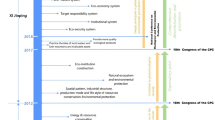Abstract
Building on the methodological and empirical contributions of the various authors in this special symposium, this concluding reflection acknowledges the important role that informality plays in urban and national politics in the global South, even as it proposes a range of alternative ways, this critical topic could and should be inserted into contemporary scholarship in comparative politics. It begins with a discussion of two decades of research on urbanization and economic globalization, thus introducing a wider set of disciplinary concerns than merely urban servicing into the study of informality, ranging from the transformation of property rights regimes in the context of ascendant neo-liberalization to the recent emergence of more decentralized political structures for claim-making and governance. The essay then suggests that greater historical and contextual specificity in the study of informality, along with the methodological innovations highlighted in the papers, will further help reveal the range of responses to informality seen across the different case studies. Specifically, it proposes that closer attention to divergent urban and national pathways of democratization, attention to institutional variations within and across democratic regimes, political party dynamics at the local and national level, and the existence of urban violence, among other factors, will help explain how and why bureaucrats and elected officials may choose to deal differently with the existence of informality. The essay concludes by arguing that informality should be considered as both a form of governance and a means of enacting citizenship. It thus asks scholars to question the longstanding conceptual dichotomies that permeate much of the literature on informality, including the stark conceptual divide between the formal and informal, and instead to recognize that complex, interactive, and iterative relationships between citizens and the state in the arena of informality are what drive urban servicing and sociopolitical change.
Similar content being viewed by others
References
Angel S et al. Making room for a planet of cities. Lincoln institute of land policy, Cambridge, MA; 2011.
Azuela A. Low income settlements and the law in Mexico City. Int J Urban Region Res. 1987;11(4):522–42.
Beall J. Surviving in the city: livelihoods and linkages of the urban poor. In: Devas, N., (ed.) Urban Governance, Voice, and Poverty in the Developing World. Earthscan, London; Sterling, VA; 2004. pp. 53–67. ISBN 1853839922.
Becker KF. The informal economy: fact finding study. Sida: Department for Infrastructure and Economic Co-operation; 2004.
Boudreau J-A, Davis DE. Introduction: a processual approach to informalization. Curr Sociol. 2017;65(2):151–66.
Davis DE. Informality and state theory. Curr Sociol. 2017a;65(2):315–24.
Davis DE. Rethinking the role of social, spatial and political conditions in the study of informality. In: Hernandez F, Becerra A, editors. Marginal urbanisms: informal and formal development in cities of Latin America. Cambridge, UK: Scholars Publishing; 2017b.
De Alba F. Challenging state modernity: governmental adaptation and informal water politics in Mexico City. Curr Sociol. 2017;65(/2):182–94.
Glaeser E. Triumph of the city: how our greatest invention makes us richer, smarter, greener, healthier, and happier. New York: Penguin Press; 2011.
Harvey D. The right to city. The New Left Review; 2008; 53.
Hassan A et al. How to meet the Millennium Development Goals (MDGS) in urban areas. Environ Urban, 2005; 17/1.
Martine G et al. editors. The new global frontier: urbanization, poverty and environment in the 21st century. Earthscan, London; 2008.
Naqvi. Governance as an emergent compromise: modernization and flexibility in the Pakistani electrical power sector. Curr Sociol; 2017. 65/2 195–208.
Olds K. Globalization and the Asia-Pacific region: captial, culture, and Pacific rim mega projects. Oxford, UK: Oxford University Press; 2011.
Porter M. The economic performance of regions. Reg Stud. 2003;37(6–7):549–78.
Romer. The macroeconomic effects of tax changes: estimates based on a new measure of fiscal shocks. American Economic Review, Am Econ Assoc; 2010. 100/3: 763–801.
Roy A, AlSayyad N. Urban Informality: international perspectives from the Middle East, Latin America, and South Asia. Lexington Books, Langham, MA; 2005.
Satterthwaite D. The transition to a predominantly urban worlds and its underpinnings. International Institute for Environment and Development, Human Settlements Discussion Paper Series, Theme: Urban Change –4; 2007.
Schavelzon S. El nacimiento del estado plurinacional de Bolivia: Etnografía de una asamblea constituyente. La Paz: Plural Editores; 2012.
Sharma A, Gupta A, editors. The anthropology of the state: a reader. Oxford: Blackwell; 2006.
de Soto H. The mystery of capital. Finance and Development; 2001: 31/1.
Yamauchi F et al. Human capital accumulation, migration, And the transition from urban poverty: evidence from Nairobi slums. International Food Policy Research Institute, Washington DC; 2009.
Author information
Authors and Affiliations
Corresponding author
Rights and permissions
About this article
Cite this article
Davis, D.E. Reflections on “The Politics of Informality”: What We Know, How We Got There, and Where We Might Head Next. St Comp Int Dev 53, 365–378 (2018). https://doi.org/10.1007/s12116-018-9273-2
Published:
Issue Date:
DOI: https://doi.org/10.1007/s12116-018-9273-2




